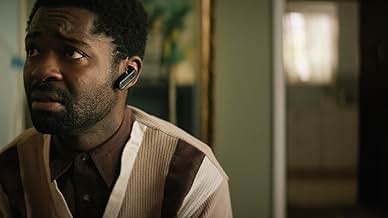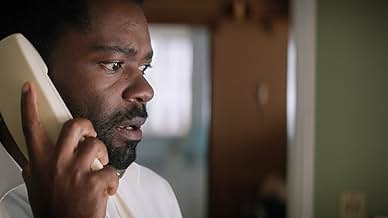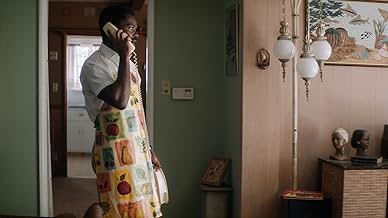NOTE IMDb
6,4/10
2,1 k
MA NOTE
Ajouter une intrigue dans votre langueA lonely war veteran psychologically unravels ahead of an old friend's impending visit.A lonely war veteran psychologically unravels ahead of an old friend's impending visit.A lonely war veteran psychologically unravels ahead of an old friend's impending visit.
- Réalisation
- Scénario
- Casting principal
- Nommé pour 2 Primetime Emmys
- 4 victoires et 12 nominations au total
Avis à la une
Never mind Gus Van Sant's ill-advised 1998 remake: here is our ideal 21st century adaptation of Psycho. Instead of custodianship, our contemporary Norman Bates directs his spiteful and playfully sulky jabs to Mother through a video blog while eagerly preparing for guests, yet is shown to be just as fraying in sanity. But there's nothing mad about Nightingale, which ticks along with absorbing insistence, unspooling its familiar narrative of obsession and yearning with deftness and ease.
Any single actor show is always a commitment, but director Elliot Lester keeps the proceedings lively and engaging, with cameras mesmerizingly gliding through every last inch of Peter Snowden's house, while the disjuncture between long, still takes and rapid cutting empathetically mirror his manic shifts in energy, even blurring the frame imperceptibly in solidarity with his drunkenness. Writer Frederick Mensch employs every conceit in the book to stave off stagnation (including a choice HBO gag the film's original viewership must have relished). He motivates Snowden's monologuing and teasing crucial exposition through key props and devices, including his mother's makeup mirror, phone conversations, prayer, and his vlogging interludes, each teasing out distinct strands of personality coalescing into a disturbed but wholly realized individual. Meanwhile, Mark D. Todd's score lends an uneasy serenity to the surroundings, as the film creeps along with a thinly veiled false sense of security.
Story-wise, which enraptures its unravelling protagonist with The Glass Menagerie's anticipation of a gentleman caller of sorts, there are few surprises, but the inevitability with which events transpire is bittersweet in itself. But beyond this cursory human experience, which is affecting enough, there's not much by way of thematic subtext. Childhood trauma and military service are teased, but left as largely self-evident, while it's unclear if the collusion in the character names "Edward" and "Snowden" is meant to imply any sort of commentary (the dichotomy between his isolated loneliness and his consistent filming and publicizing his stream-of-consciousness monologues?), but it's either clumsily implemented or vaguely distractingly gimmicky.
As such, the film is worthwhile primarily as a showcase of its lead, the magnificent David Oyelowo. Nearly unrecognizable from his star-making turn as MLK in Selma, Oyelowo, carrying virtually every frame of the film, is comparably superbly magnetic here. Sashaying through mood swings (and hair styles) encompassing outrageously silly to pouty to vitriolic and destructive, Oyelowo masterfully conjures energy through his constant tension between frenzied movement and stillness, all the while carrying a wealth of achingly sympathetic unspoken backstory in his increasingly bloodshot eyes. It's a spectacular turn, and if, granted, he's the predominant draw and purpose Nightingale, he alone is easily well worth the experience.
-7.5/10
Any single actor show is always a commitment, but director Elliot Lester keeps the proceedings lively and engaging, with cameras mesmerizingly gliding through every last inch of Peter Snowden's house, while the disjuncture between long, still takes and rapid cutting empathetically mirror his manic shifts in energy, even blurring the frame imperceptibly in solidarity with his drunkenness. Writer Frederick Mensch employs every conceit in the book to stave off stagnation (including a choice HBO gag the film's original viewership must have relished). He motivates Snowden's monologuing and teasing crucial exposition through key props and devices, including his mother's makeup mirror, phone conversations, prayer, and his vlogging interludes, each teasing out distinct strands of personality coalescing into a disturbed but wholly realized individual. Meanwhile, Mark D. Todd's score lends an uneasy serenity to the surroundings, as the film creeps along with a thinly veiled false sense of security.
Story-wise, which enraptures its unravelling protagonist with The Glass Menagerie's anticipation of a gentleman caller of sorts, there are few surprises, but the inevitability with which events transpire is bittersweet in itself. But beyond this cursory human experience, which is affecting enough, there's not much by way of thematic subtext. Childhood trauma and military service are teased, but left as largely self-evident, while it's unclear if the collusion in the character names "Edward" and "Snowden" is meant to imply any sort of commentary (the dichotomy between his isolated loneliness and his consistent filming and publicizing his stream-of-consciousness monologues?), but it's either clumsily implemented or vaguely distractingly gimmicky.
As such, the film is worthwhile primarily as a showcase of its lead, the magnificent David Oyelowo. Nearly unrecognizable from his star-making turn as MLK in Selma, Oyelowo, carrying virtually every frame of the film, is comparably superbly magnetic here. Sashaying through mood swings (and hair styles) encompassing outrageously silly to pouty to vitriolic and destructive, Oyelowo masterfully conjures energy through his constant tension between frenzied movement and stillness, all the while carrying a wealth of achingly sympathetic unspoken backstory in his increasingly bloodshot eyes. It's a spectacular turn, and if, granted, he's the predominant draw and purpose Nightingale, he alone is easily well worth the experience.
-7.5/10
Nightingale is gripping and well acted. Very powerful.David Oyelowo is excellent .
I would imagine doing a movie solo is difficult but David Oyelowo carries it off effortlessly.
It's not easy to call Nightingale horror. But then again if Nightingale isn't horror, what is? David Oyelowo stars in the 2014 film from Executive Producer Brad Pitt's entertainment company Plan B, helmed by Director Eliot Lester (Selma), as the tormented Peter Snowden, a man who is on the downside of a lifelong battle with mental illness. In this context the film solely relies on one-sided conversations on the telephone along with pitifully accurate vlog entries and their summonsed yet unsolicited comments.
The sparse production and singular location serves as a look into Snowden's lacking support system and also paints a picture of what loneliness truly looks like.
As we follow Snowden's descent into madness Lester feeds us the pieces of Snowden's life we need to begin to understand the psychosis that brings him to this moment in time. In doing so Lester reminds us that mental illness is comprised of two parts; the first being the genetic makeup of an individual which makes it more likely to being susceptible to the illness and the second being the environment a person develops in, which plays a large role in a person's growth-or lack of.
At one time relatable and almost silly David Oyelowo's character work as Peter Snowden is complex; it almost appears too simple until we realize we've been fooled. Why do we question every interaction Snowden has with his acquaintances? Is he even speaking to another person on the other line or is every conversation living only in Snowden's mind? Viewers will know the answer to that question as concretely as Snowden himself knows for certain the difference between reality and psychosis.
All the weight of Nightingale rests on its very conclusion where the very talented David Oyelowo serves a lifetime of pain and then a way out. It's a bleak film, with an even bleaker ending. Then again, how many people do you know who suffer from severe mental disability who actually have their happy ending?
The sparse production and singular location serves as a look into Snowden's lacking support system and also paints a picture of what loneliness truly looks like.
As we follow Snowden's descent into madness Lester feeds us the pieces of Snowden's life we need to begin to understand the psychosis that brings him to this moment in time. In doing so Lester reminds us that mental illness is comprised of two parts; the first being the genetic makeup of an individual which makes it more likely to being susceptible to the illness and the second being the environment a person develops in, which plays a large role in a person's growth-or lack of.
At one time relatable and almost silly David Oyelowo's character work as Peter Snowden is complex; it almost appears too simple until we realize we've been fooled. Why do we question every interaction Snowden has with his acquaintances? Is he even speaking to another person on the other line or is every conversation living only in Snowden's mind? Viewers will know the answer to that question as concretely as Snowden himself knows for certain the difference between reality and psychosis.
All the weight of Nightingale rests on its very conclusion where the very talented David Oyelowo serves a lifetime of pain and then a way out. It's a bleak film, with an even bleaker ending. Then again, how many people do you know who suffer from severe mental disability who actually have their happy ending?
It is a testimony to both the script and the acting in this film that I watched from beginning to end and was never bored. In Nightingale, which takes place in the home of a man and his mother, we watch this recently returned home veteran come to terms with many of the issues of his life, including his relationships, and the components of his emotional state, namely his wishes, hopes, fears, disappointments, etc. Other people in his life are implied through phone calls and letters. David Oyelowo does a superb acting job in which he travels through different mental states and changes, without going over the top which would have rendered it unbelievable and unwatchable, for me. From beginning to end, he was utterly believable as a man, trying to live, while coming undone.
Le saviez-vous
- AnecdotesDavid Oyelowo stated that ,"For the three weeks we shot the film, I didn't come out of character."
- Citations
[Last lines]
Peter Snowden: Come, Lord Jesus. Come.
Meilleurs choix
Connectez-vous pour évaluer et suivre la liste de favoris afin de recevoir des recommandations personnalisées
- How long is Nightingale?Alimenté par Alexa
Détails
- Durée
- 1h 23min(83 min)
- Couleur
Contribuer à cette page
Suggérer une modification ou ajouter du contenu manquant





















